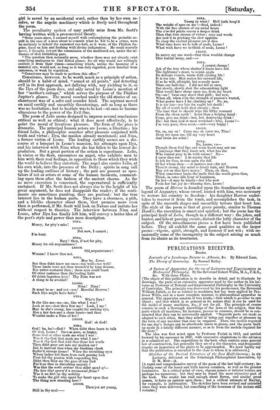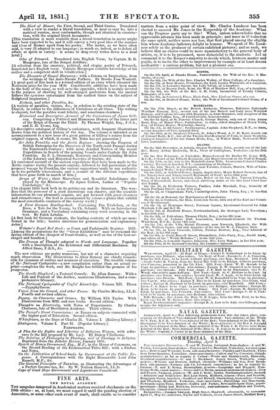PUBLICATIONS RECEIVED,
BOORS.
Journals of a Landscape Painter in Albania, Fre. By Edward Lear. The Theory of Reasoning. By Samuel Bailey.
A System of Apparatus for the use of lecturers and Experintenters Us Mechanical Philosophy. By the Reverend Robert Willis, M.A., FJ3..S., &c. With three Plates.
[The object of this publication is to describe in detail, and to illustrate by drawings, the parts of an extensive apparatus used by the author in his lec- tures as Professor of Natural and Experimental Philosophy in the University of Cambridge. The principle was discovered by his predecessor, the Reverend William Farish, so far as related to machines, but has been applied by Pro- fessor Willis, and in a more complete manner, to philosophical apparatus in general. The apparatus consists of two kinds,Lthat which is peculiar to one object ; and that which is so general in its nature that it can be used for the model of many machines, &e., if not for all. The principle of course consists in such a thorough knowledge of the laws of the subject, that the parts which all machines, for instance, possess in common, should be so con- structed that they can be universally applied. "Separate parts are made so adapted to each other, that they admit of being put together at pleasure in the form of any machine that may be required. Thus, the models required for one day's lecture can be afterwards taken to pieces, and the parts built up again in a totally different manner, so as to form the models required for the next."
The idea was first acted upon by Professor Farish in 1813, and carried forward by his successor in 1837, with successive adaptations to the advance in if echanical art. The expositions in the book often contain some general law of construction, but generally they are of a dry character, and frequently require an inspection of the plates to be apprehended. We need hardly say that the publication is essential to the class to whom it is addressed.] Sketches of the Poetical Literature of the Past Half-Century; in six Lectures, delivered at the Edinburgh Philosophical Association, by D. M. Moir—A.
[A rapid and comprehensive survey of the poets of the last half-century; in- cluding some of the lesser and little known versifiers, as well as the greater luminaries. In a critical point of view, obscure names or inferior writers are perhaps too numerous; but they may be found the most attractive part of the book. The reader has read enough about Byron' and similar great names, to have an opinion upon them ; but a critical estimate of Hayley, for example, is information. The sketches have been revised and extended since they were delivered, but something of the looseness of the lecture still. remains.] The Iliad of Homer, the First, Second, and Third Cantos. Translated with a view to render a literal translation, as near as may be, into a metrical version, most conformable, though not identical in construc- tion, with the original Greek hexameter. translation is more readable than a literal translation in metre might have been expected to be, and it will convey a very good idea of the manner and ideas of Homer apart from his poetry. The metre, as we have often said, is very ill adapted to our language; so much so, indeed, as to defeat all efforts at spirit or variety : it seems to drag every writer down to a dead
level.]
Odes of Petrarch. Translated into English Verse, by Captain R. G. Macgregor, late of the Bengal Artillery.
[A selection from the amatory, political, and elegiac poetry of Tetrarch, translated into English verse. Captain Macgregor exhibits knowledge of his author and a competent skill in versification.]
The Elements of Gospel Harmony; with a Catena on Inspiration, from the writings of the Ante-Nicene Fathers. By Brooke Foss Westcott. [A great part of this book is a revised edition of an essay which obtained the Norrisian prize for the year 1810. Considerable additions have been made to the body of the essay, as well as to the appendix, which is mainly devoted to the purpose of showing by well-arranged quotations from the ancient fathers the opinions entertained from the earliest times on the subject of Scriptural inspiration.] Eceksia, and other Parables, &c.
(A variety of parables, visions, &c., in relation to the existing state of the Church, or rather to the differences of Christians at all times. The writing is elegant, but the parables want felicity, and sometimes clearness.]
Historical and Descriptive Account of the Caricatures of James Gill- ray. Comprising a Political and Humorous History of the latter part of the Reign of George the Third. By Thomas Wright, Esq., F.S.A., and R. H. Evans, Esq.
[it. descriptive catalogue of Gillray's caricatures, with frequent illustrations drawn from the political history of the day. The volume is intended as an accompaniment to a new issue of a great portion of Gillray's satires from the original coppers, of which, it seems, Mr. Bohn has got possession.]
Sir John Franklin and the Arctic Regions : showing the Progress of British Enterprise for the Discovery of the North-west Passage during the Nineteenth Century; with more detailed Notices of the recent Expeditions in Search of the missing Vessels under Captain Sir John Franklin. By P. L. Simmonds, Honorary and Corresponding Member of the Literary and Historical Societies of Quebec, &c.
[A condensed account of the sixteen expeditions that have been made to the Arctic legions during the present century, followed by full particulars of the proposed voyage by Franklin, the various suggestions made by any authority as to his probable whereabouts, and a resume of the different expeditions that have gone forth in search of him.]
Drops of Water ; their Marvellous and Beautiful Inhabitants dis- played by the Microscope. By Agnes Catlow, Author of "Popular Conchology," &c.
[An elegant little book both in its getting-up and its literature. The won- ders that the possessor of a good microscope can observe, and the scientific information he can pleasantly acquire, are put forward with great clearness and attractiveness ; the text is accompanied by coloured plates that exhibit the most remarkable creatures of the watery world.]
A _First German Reading-book. Containing Das Taubchen, or the Dove, a Tale for the Young, by Ch. Schmid. With an Introductory Grammar, and a Vocabulary containing every word occurring in the text. By Feick Lebahn.
[A first book for German students, the leading contents of which are men- tioned in the title ; besides directions for pronunciation and explanatory notes.]
Webster's Royal Red Book; or Court and Fashionable Register. 1851. [Among the preparations for the "Great Exhibition' may be reckoned the spring edition of the cheapest of Court-Guides, as well as one of the best-ar- ranged and handiest.] The Process of Thought adapted to Words and Language. Together with a Description of the Relational and Differential Machines. By Alfred Smee, FJLS., &c.
The new editions are pretty numerous, but not of a character requiring much observation. The illustrations to Allan Ramsay are chiefly remark- able for clearness of outline and neatness of execution. The twelfth volume of tin National Cyclopedia—a new compilation rather than an actual re- print—completes the work, and Mr. Knight has fulfilled the promise of his prospectus.
The Gentle Shepherd ; a Pastoral Comedy. By Allan Ramsay. With a Life and Portrait of the Author, numerous Illustrations, and a com- prehensive Glossary.
The National Cyclopedia of Useful Knowledge. Volume UT. Theca —Zygophyllacese.
Voices from the Crowd, and other Poems. By Charles Mackay, LL.D. Fourth and revised edition.
Popery, its Character and Crimes. By William Elfe Taylor. With Illustrations from MSS. and rare books. Second edition.
Thoughts on Electricity, with Notes of Experiments. By Charles Chalmers, late of Merchiston Academy. Third edition.
The Parent's Great Commission ; or Essays on subjects connected with the higher part of Education. Second edition.
Whitefriars, or the Days of Charles II. Volume I. (Railway Library.) Shakspeare. Volume L Part II. (Popular Library.)
PAMPHLETS.
A Plea for the Rights and Liberties 0/ Religious Women, with refer- ence to the Bill proposed by Mr. Lacy. By Bishop Ullathorne. The Relation of Philosophy to Theology, and of Theology to Religion. Reprinted from the .Eclectic Review., January 1851. Speech of Henry Drummond, Egg., m.p., in the House of Commons, on the Second Reading of the Ecclesiastical Titles Bill; with a Preface and Notes.
On the litblication of School-books by Government at the Public Ex- pense. A Correspondence with the Right Honourable Lord John Tttussell, M.P., The General Principles of Taxation, as illustrating the Advantages of a Perfect Income-tax, &c. By W. Neilson Hancock, LL.D. Cape of Good Hope Government and Legislature Considered.



























 Previous page
Previous page